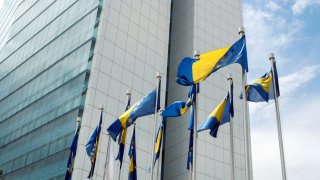Identity Politics Is Holding Up Balkan Energy Development
By tying an energy project to a certain vision of Bosnian national identity, Washington is inadvertently helping Chinese and Russian interests.
Weeks before President Trump retakes the White House, an American ambassador is tanking a strategic gas pipeline that would increase U.S. natural gas exports to Europe. In the process, he has damaged a country’s national sovereignty and worsened Balkan instability, all in the name of the State Department’s identity politics.
The Southern Gas Interconnection pipeline would feed U.S. natural gas to Bosnia-Herzegovina and end that country’s reliance on Russian energy imports. In 2019, neighboring Croatia’s government bucked its climate lobby by building a floating liquified natural gas terminal to wean Eastern Europe off Russian energy dependency. Its strategic value has helped make the U.S. the largest LNG supplier to Europe. Croatia wants to expand the pipeline further.
Yet, the State Department has hamstrung the plan with an aggressive nation-building project that seeks to force the country’s Catholic Croats and Orthodox Serbs to dispense with their national identity and adopt an overarching Bosnian identity embraced only by the country’s Muslim leadership. In fact, many Bosniak Muslims have taken Croatian citizenship, betraying little actual belief in a Bosnian construct.
Bosnia-Herzegovina has not moved on from the 1995 Dayton Accords, which ended the war in the Balkans. Instead, it has been saddled with an unworkable constitutional framework in which international diplomats have pushed an “anti-nationalist” ideological agenda while enjoying ultimate legal authority over the country. Serbs govern half the country, and Croats and a larger number of Bosniak Muslims rule the other half jointly. Neither entity enjoys sovereignty. Indeed, it is a failed state.
A new law to authorize the pipeline extension presented outgoing U.S. Ambassador Michael Murphy a last-ditch chance to impose the State Department’s identity politics on the country by forcing Croat parliamentarians to hand control of the pipeline to Sarajevo’s corrupt and indebted state gas operator in a country whose level of corruption is rated worse than that of Ukraine. BH Gas’s management team is entirely Bosniak, reflecting the systemic employment discrimination that has led to the halving of the Croat population. Croatian leaders seek a new entity to manage the project. Nevertheless, the law passed with no Croat votes, which has exacerbated inter-communal tensions.
Parliamentary deputy speaker Mladen Boskovic, a Croat, blasted the outcome: “This law was written in such a way that Croats were deleted as participants in the process of designing and routing the gas pipeline. All decisions will be left to one company under the complete control of the Bosniak parties.”
Murphy earned a sharp rebuke from Croatian president Zoran Milanovic, a backer of the pipeline, accusing “foreign governors of humiliating and systematically disintegrating Bosnia and Herzegovina as a state.”
Murphy’s overt intervention to get the gas law passed was unprecedented. He publicly accused Croat officials of Russian collusion for opposing it and their elected leader of seeking “personal political and economic benefit.” Yet, the previous director of BH Gas had previously resigned to avoid becoming “an accomplice to [the company’s] criminal actions.”
About a dozen U.S. Embassy staff hounded Croat parliamentarians in their offices during the vote proceedings, prompting some to walk out in protest. According to local media, Murphy threatened them with sanctions. Bosniak parliamentarians, uneasy about breaking the tradition of consensus decision-making on key legislation, were threatened with dismissal by our officials.
This region is familiar to millions of American Catholics. The pipeline route passes by Medjugorje, a village visited by 40 million Christian pilgrims who believed it hosted apparitions of the Virgin Mary. The combination of Christian fervor and the economic boon it has generated there is anathema to the Biden administration’s global crusade for abortion and an LGBTQ agenda that Secretary Blinken declared “profoundly in our national interest.”
In nearby Hungary, the U.S. ambassador has led a culture war against its conservative government. Nathalie Rayes, U.S. ambassador to Croatia, one of the most pro-life countries in Europe, was vice-chair of the Planned Parenthood Action Fund.
Who are the winners that emerged from this fiasco? First, Russia, as Croatia is unlikely to proceed with its section of the pipeline while its ethnic kin in Bosnia-Herzegovina are locked out of the project. Communist China gains from growing tensions within Europe. Turkey wins, given its familial relations with Sarajevo’s Muslim leadership and its global ambition to promote political Islam. The losers? The Catholic Croats see little stake in a state that treats them as second-class citizens. For America, Murphy’s law undercuts the prospect of securing American energy dominance in Europe.
The gas law now goes to the upper chamber, the House of Peoples, where it needs to muster a majority of Muslim, Serb, and Croat deputies, each wielding veto power. Croats are expected to lose that constitutional protection as well, as the country’s High Representative, a European diplomat empowered by Dayton with the final say over all of Bosnia-Herzegovina’s laws, is expected to side with the Bosniaks.
Max Primorac is a Senior Research Fellow at the Margaret Thatcher Center for Freedom, The Heritage Foundation. He was the Acting Chief Operating Officer at the U.S. Agency for International Development.
Image: BalkansCat / Shutterstock.com.

